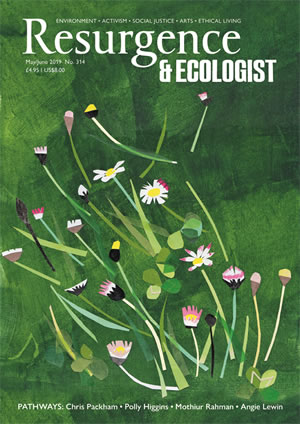Satish Kumar’s new book Elegant Simplicity: The Art of Living Well is full of wisdom. Simplicity is consonant with ease, simple can mean easy, yet Satish argues that the pursuit of simplicity is the key to living life at the deepest, the innermost level. This is difficult because, for one thing, it involves reducing our possessions and wealth to the point of reasonable comfort, and fighting off the desire to acquire; a desire that today’s consumerist society enflames. We have to learn in Satish’s words: “there is an innate elegance in minimizing possessions and maximizing comfort.” It follows that acquiring more possessions than you need is inelegant and doesn’t make for comfort. If only that were more obvious, if only it were an easier lesson to learn, what a different world we would live in.
Satish takes simplicity far beyond the decluttering of our lives by making ourselves free of unnecessary material possessions. He says: “At the mental level, at the level of feelings and relationships, at the level of home, clothes, and food – at every level – we must ask, how can I make life simple?” We must ask it of our thoughts and minds, he argues, and he describes how ambition for name, fame, prestige and power complicates our minds. These ambitions are encouraged by today’s celebrity culture. Satish quotes the Bhagavad Gita, which teaches that we should “act without desiring the fruit of the action”. To be willing to act like that is to avoid the crippling fear of failure that can hold us back from doing what we can and ought to do, and the demeaning jealousy of those more successful than we are.
A theme I would call ‘the uncertainty of certainty’ runs through this book. Satish says, “Spiritual seekers are always on a journey, on a pilgrimage, seeking truth and enlightenment. There is no place where they can say, ‘I have found the answer.’ ” In other words, our minds shouldn’t be clogged by beliefs and ideas, concepts and dogmas that we cling on to, refusing to adjust them with experience, refusing to question them or to admit that they are not the only answer.
Accepting uncertainty requires humility – the humility to admit that you might be wrong. According to Satish, “Simplicity leads to humility. Humility leads to right relationship, right communication, right understanding, and right appreciation.” He calls on scientists and spiritual seekers to be humble and generous in order to realise that each needs the other. All too often scientists give the impression that science knows all the answers, and spiritual seekers deny that science has anything to say to them.
Living simply isn’t just a matter of our personal lives, our relationship with ourselves. We have to be concerned about our relationship with society and with Nature. To make that clear, Satish has proposed a new trinity for this century: Soil, Soul, Society. Soil reminds us of our dependence on Nature. This we forgot in the 20th century, called by Satish the century of the economy. Soul is a metaphor for our spiritual health, which we must care for. Then our concern must be extended to the society we live in. Satish says, “Human-scale society is a spiritual imperative.”
Satish’s book is appropriately simple in the best sense. It’s written with elegant simplicity, as Fritjof Capra says in his foreword, and provides a simple guide for the perplexed, to borrow the title of a famous book written by a man who has meant so much to Satish, E.F. Schumacher. It’s a guide much needed in this age of perplexity.







